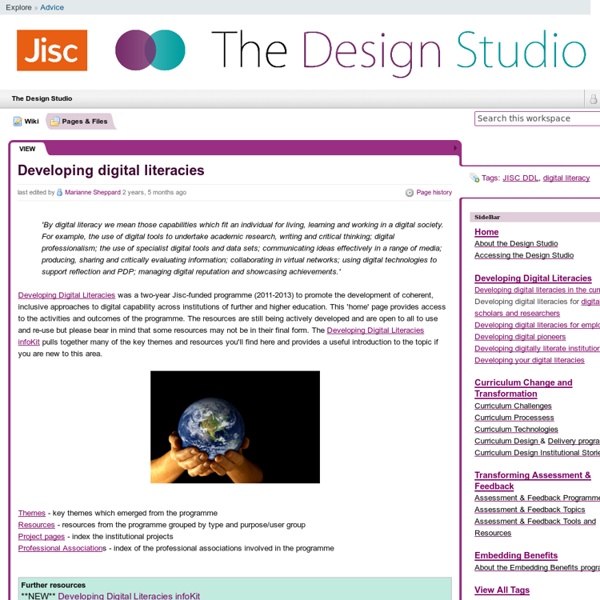Don't mind the gap
Earlier this year the House of Lords digital skills committee published a report calling for the teaching of digital skills in schools to be treated as a third core subject, on a par with lessons in numeracy and literacy. The committee also called for urgent action to support teachers who are not sufficiently well equipped to teach the new computing curriculum, insisting that no child should leave school without basic digital literacy. This got me thinking.
H of Lords report on digital skills
Recommendations The report, entitled "Make or Break: The UK's Digital Future", urges the incoming Government to seize the opportunity to secure the UK’s place as a global digital leader by, among other things: making digital literacy a core subject at school, alongside English and Maths; viewing the internet as important as a utility, accessible to all; andputting a single ‘Digital Agenda’ at the heart of Government. The report also noted that there are certain sectors of society, and UK regions, falling behind at great cost to the economy; and that industry has a vital role to play in developing the right skills in the workplace, in further and higher education, and in schools. The report also found that there is a distinct lack of Government coordination on digital initiatives – the current digital 'activity' within Government includes four Government Ministers, a Taskforce, a Committee, and a Unit.
Yes, Digital Literacy. But Which One?
One of the problems I’ve had for a while with traditional digital literacy programs is that they tend to see digital literacy as a separable skill from domain knowledge. In the metaphor of most educators, there’s a set of digital or information literacy skills, which is sort of like the factory process. And there’s data, which is like raw material. You put the data through the critical literacy process and out comes useful information on the other side. You set up the infolit processes over a few days of instruction, and then you start running the raw material through the factory, for everything from newspaper articles on the deficit to studies on sickle cell anemia. Useful information, correctly weighted, comes out the other end.
untitled
Students can often take the easy way when generating a presentation, creating lists of bullet points from a source text, without thinking about the effectiveness (or not) of such approaches or how close they may be to plagiarism of the source. As educators who are seeking to develop students transferable skills we need to facilitate the acquisition of more imaginative approaches to oral presentations by students. “Reconstructing” the source information to create something more visual may itself facilitate learning. In this post Maria Jackson (FHEA, Senior University Teacher, University of Glasgow, Maria.Jackson@glasgow.ac.uk) outlines the experiences that led her to consider 'banning the bullet' in future student presentations.
Basic Digital Skills Definition
In the UK, 1 in 5 adults lack the following Basic Digital Skills. Want to know why? Take a look at what the common barriers to digital exclusion are. The Basic Digital Skills definition has been adopted to focus partner support and celebrate success. We have consulted widely with a range of stakeholders including academics at the London School of Economics (LSE), our Go ON UK board partners, Citizens Online, the London Business School and Tinder Foundation in the development of the Basic Digital Skills definition.
The 14 Most Destructive Millennial Myths Debunked by Data
“My generation sucks.” “Embarrassing to be apart of the “handout” generation offended by everything.” “I’m a millennial and I’m NOT proud, my generation is so brainwashed and could easily be conditioned to losing America they way we know it.”
One in ten adults have no IT experience
One in ten adults have no experience of using computers, according to a report published by the OECD last month. The report, “Adults, Computers and Problem Solving – What’s the Problem”, reveals some key patterns concerning levels of ICT competence across the OECD and their consequences. While one third of adults across OECD nations participating in the 2012 PIAAC Survey of Adult Skills are at the highest levels of proficiency in using ICT, the survey also reveals that a significant proportion of adults have limited ICT skills or indeed no experience of using computers at all. On average across all countries surveyed around one in five adults had very limited ICT skills with one in 10 having no experience of using computers at all. Variations between countries The OECD report also highlights notable variations in ICT competence levels between countries.
DCMS Digital Inclusion Outcomes Framework
The Digital Inclusion Outcomes Framework is a single, flexible template for benchmarking and tracking digital inclusion in the UK, and evaluating digital inclusion activities locally. It aims to evidence the wider economic, health and social benefits of digital inclusion. It was developed by the Government Digital Service (GDS) Digital Inclusion Research Working Group, which brings together representatives from academia, government, private sector organisations and charities.
Digital Media, Culture and Education - Theorising Third Space
“Brings to life the lived experience and creativity of young people and makes visible their meaning making practices. It surfaces ideas in ways that are theoretically and methodologically ground-breaking … a refreshing, hopeful, and above all, challenging book, that enables, develops and supports new thinking in media education and literacy studies. Accessibly written, this is a welcome addition to the field, which speaks to the cultural context of civic engagement for young people in and out of school, or ‘not-school’. Now, more than ever these voices are needed as resistance is a key part of survival for young people whose modes of participation need to be strengthened and supported in a challenging world. Dynamic literacies are the way forward – and this book articulates and maps out a pathway through to action.”



